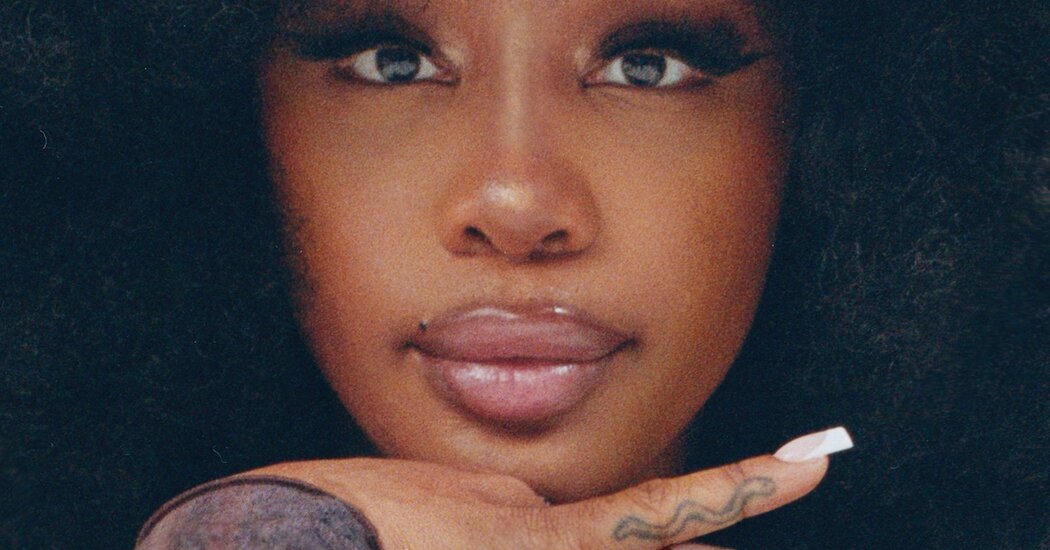Then her family found out. “My sister got my ass,” SZA said. At the strip club, “there was a banner of me with like, a bottle of Hennessy, next to a pole. It was bad.” Panya told their mother about it, and Audrey promptly drove by the club. She couldn’t find the banner. But still, SZA said with a giggle about her sibling, “My sis is a cretin.”
“When I wouldn’t do the college thing they wanted,” SZA said in Malibu, “my mom kind of insinuated that I had to, like, get out.” She laughed. “I started staying on people’s couches, and vibing aimlessly. That sent me into a crazy depression but also lit a fire under my ass.”
Things were tense. “She named her album ‘Ctrl’ for a reason,” Audrey Rowe told me. “I had this willingness to go with her interests, but I also had an end result I thought would be appropriate.” Rowe said that getting a college education was drilled into Solána’s head by both her and her husband. “So, clearly, the arts would not have been my choice,” Rowe said. But Solána loved music. A close friend, Daniel Pierre, asked her to sing on one of his songs, and she told Complex in 2013, “That was the beginning of hearing my voice and being like, I can do something.”
After her brief tenure at Delaware State, Solána attended the Fashion Institute of Technology — for a summer. “I wish I knew then what I know now,” Rowe said, “about listening to what your child has a passion for, and supporting that, whatever it is.” At F.I.T., Rowe said, “she did take some classes that we paid for, and her skills just soared.” Rowe said people often walked up to her daughter in public and asked where they could purchase the handcrafted items Solána was wearing. To her mother’s dismay, Solána would frequently remove articles of clothing and give them to the admirer — a precursor to SZA’s sharing stitched intimacies in free mixtapes. “It’s so hard to follow your own dreams,” Rowe said. “So many of us abandon it very young, especially if the people that we respect and love and trust think we could or should be doing something different. I’m so glad that she didn’t listen to me.”
Solána’s leap from barkeep to the cutthroat cool-kid universe of 2010s New York came after that summer at F.I.T., when she interned at Billionaire Boys Club, the fashion label founded by Pharrell Williams and Nigo, the music-and-clothing impresario. She also worked for Scott Sasso’s 10.Deep — a now all-but-defunct streetwear brand popping enough back then to be shouted out on early A$AP Rocky songs.
The year 2011 was a sumptuous one for Black music. Kelly Rowland’s eerie “Motivation” owned the after-hours, while Nicki Minaj’s “Super Bass” ruled radio. Beyoncé announced her first pregnancy with a tummy rub while performing “Love on Top” at the MTV Video Music Awards. And “We Found Love,” by Rihanna and Calvin Harris, was at the top of the pops. The song and its mesmeric video presented Rihanna as spiraling Black-girl royalty. Tyler, the Creator’s Odd Future crew, especially Frank Ocean, Syd and Domo Genesis, were the new confessional kids, fluid and gawky as hell, wilding onstage like punks crossed with posse rappers. Back then, illegal mixtapes, not unlike the pirate radio of previous generations, were the apotheosis of musical creativity — artists rhyming over other artists’ beats without copyright permissions or payment — and SZA was singing her own songs over internet instrumentals plucked from producers including Brandun DeShay, a former member of Odd Future.
It was into this charged air that SZA found herself delivering 10.Deep gear to the Top Dawg Entertainment team in New York. Founded in 2004 by Anthony Tiffith, who goes by Top Dawg, Top Dawg Entertainment is an indie label out of Carson, Calif., near Watts’s Nickerson Gardens public housing projects, where Tiffith and Punch Henderson grew up. T.D.E. seemed to rise from the ashes of Death Row Records. In the early 2010s, the label was ascendant. A Los Angeles mixtape kid, bloggers’ hero and T.D.E. signee named Kendrick Lamar was headlining a showcase at the Gramercy Theater. His debut album, “Section.80,” was ruling the rap underground and establishing him as the label’s main focus.
